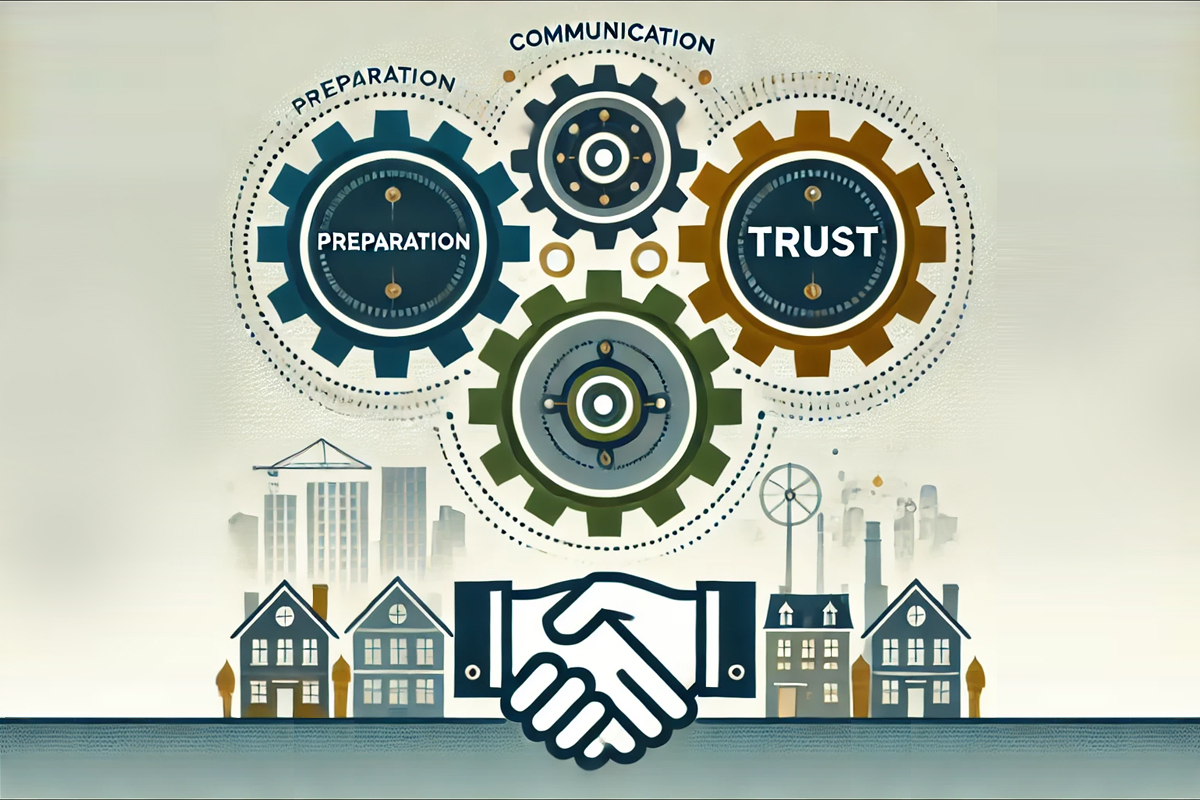
Searching for the perfect place to call home can feel overwhelming, especially when you’re faced with a choice between condos and apartments. Both can offer comfortable living spaces and attractive Read more...
Searching for the perfect place to call home can feel overwhelming, especially when you’re faced with a choice between condos and apartments. Both can offer comfortable living spaces and attractive amenities, but they provide very different experiences. By understanding how they differ in ownership, costs, responsibilities, and lifestyle, you can decide which option is the best fit for you.
Defining Condos and Apartments
An apartment is a unit you rent in a building owned by a landlord, who could be a company, investment group or even an individual. When you rent an apartment, you don’t own the property and must follow the landlord’s rules.
A condo is a unit you own within a larger building or community. You’re responsible for maintaining your individual unit, while you and the other owners share the upkeep and costs of common areas—like hallways, lobbies, and fitness centers—through a homeowners association (HOA). You are also subject to the rules of the HOA.
Regional Variations
Keep in mind that condos and apartments can vary depending on where you live. Different cities and states have their own rules and customs about tenant rights, condo associations, and typical amenities. Before you choose, do some research on local laws, common fees, and the general housing market in your area.
Ownership: The Core Difference
Apartments: You pay rent to live in a space you do not own. The landlord makes key decisions about maintenance, upgrades, and rules.
Condos: You own your unit and share common areas with other owners. You have more decision-making power through the HOA, but must also follow the HOA’s rules and pay fees.
Responsibilities: Who Takes Care of What?
Apartments: The landlord usually handles repairs and maintenance. If something breaks, you call them to fix it.
Condos: Condo owners are responsible for repairs inside their unit. If something breaks, it’s your job to hire someone to fix it. The HOA often maintains common areas, handles larger building issues, and pays for those with the monthly fees collected from owners.
Costs: Rent vs. Mortgage, Taxes, and Fees
Apartments: You pay monthly rent, which may increase when you renew your lease. You might also have extra charges for parking or pets.
Condos: Owning a condo often means paying a mortgage, property taxes, and monthly HOA fees. The fees paid to the HOA funds insurance for common areas, building maintenance, and amenities. Sometimes, if the building needs a major repair—like a new roof—owners may have to pay a special assessment fee in the event there aren’t adequate reserves to pay for the item.
Insurance Considerations
Apartments: Renters typically need renter’s insurance, which is usually low-cost and covers personal belongings.
Condos: Owners need a homeowners insurance policy (often called an HO-6 policy) for the inside of their unit. The HOA’s master policy may cover the building’s exterior and shared areas. It’s important to understand what the HOA’s insurance covers so you know what your responsibilities are.
Amenities and Management
Apartments: Amenities, such as pools or fitness centers, are managed by the landlord or property management company. Renters have little say in how these spaces are run.
Condos: Amenities are managed by the HOA, which is made up of owners. This gives you a voice in how the building is maintained but also makes you partly responsible for its upkeep and improvement.
Lifestyle Considerations and Condo Association Dynamics: Flexibility vs. Stability
Apartments: Renting offers flexibility. When your lease is up, you can move easily without having to sell anything. However, you don’t build equity, and rent can increase over time.
Condos: Owning a condo can provide more stability and the chance to build equity if the property’s value rises. Still, selling a condo takes more effort than ending a lease, and you must follow HOA rules. These rules are outlined in documents like bylaws and CC&Rs (Covenants, Conditions, and Restrictions), and they can affect things like whether you can have pets, how you decorate, and where you park. As an owner, you can attend HOA meetings and vote on important matters like repairs, fee changes, or updates to common areas.
A well-managed HOA can help preserve or even boost a condo’s value by keeping the building in good shape and maintaining a healthy financial reserve. On the other hand, a poorly run HOA can lead to neglected maintenance, higher fees, and conflicts among owners, which can hurt property values. This means that while there’s potential for your condo to appreciate over time, there’s also the risk of depreciation if the building isn’t managed well.
Making the Right Choice
When choosing between a condo and an apartment, consider:
Do you prefer flexibility, or are you looking for long-term stability and equity building?
Can you handle the costs of a mortgage, property taxes, and HOA fees?
Are you comfortable following HOA rules and taking part in building decisions?
How long do you plan to live in this home?
By weighing these factors and researching local conditions, you’ll be better prepared to pick the option that fits your lifestyle, budget, and future goals.
If you're unsure whether condo ownership is right for you, consider attending informational sessions or workshops offered by a local real estate school. They can provide valuable insights and help you make an informed decision.
|

In today’s competitive real estate industry, finding the right real estate license school can mean the difference between barely passing your exam and confidently launching a thriving career. While many Read more...
In today’s competitive real estate industry, finding the right real estate license school can mean the difference between barely passing your exam and confidently launching a thriving career. While many schools promise comprehensive real estate courses, high pass rates, and experienced instructors, only a few truly stand out as industry leaders. Among those top-performing institutions, ADHI Schools, founded by Kartik Subramaniam, has carved out a reputation for exceptional results, student-centered learning, and cutting-edge teaching methodologies.
If you’ve been researching how to pass the real estate exam on your first try, or if you’re trying to identify which real estate license courses will give you the best shot at success, this behind-the-scenes look at ADHI Schools can offer valuable insights. Let’s pull back the curtain to understand how Kartik Subramaniam’s leadership, the school’s unique curriculum, and its focus on student support help turn aspiring real estate professionals into licensed agents with long-term career prospects.
Understanding the ADHI Schools Difference
One of the first things prospective students notice when encountering ADHI Schools is the institution’s unwavering commitment to providing a comprehensive learning experience. Unlike some real estate license schools that offer generic coursework or outdated study materials, ADHI Schools has built a dynamic curriculum that evolves with the industry. Kartik Subramaniam, who established ADHI Schools to help more students pass the California real estate exam, ensures the school’s courses reflect current market trends, state regulations, and the skills most valued by today’s brokerages. The curriculum covers every facet a future agent needs to succeed, from the legal fundamentals of property transactions to emerging technologies in real estate marketing. This holistic approach prepares students for their licensing exams and gives them a solid foundation for the practical realities they’ll face in the field.
The Leadership & Vision of Kartik Subramaniam
At the core of ADHI Schools’ success story is Kartik Subramaniam, a seasoned instructor and real estate expert dedicated to helping others break into the industry. Subramaniam’s unique perspective, informed by years of hands-on experience in California’s real estate market, allows him to guide students through complexities that textbooks alone can’t convey.
His teaching philosophy balances theoretical knowledge with practical application. He understands that to master the material and pass the real estate exam, students need more than just memorization of facts; they need to think like real estate professionals. By sharing insights from his personal journey—both the wins and the challenges—Subramaniam makes the learning process more relatable, inspiring students to stay motivated and focused.
A Data-Driven Approach to Passing the Real Estate Exam
A key factor that sets ADHI Schools apart from other real estate license courses is its data-driven approach to exam preparation. Every year, the California Department of Real Estate releases data on pass rates, common areas of difficulty, and trends in exam questions. ADHI Schools’ team mines this data to refine course content and target the areas where students need the most support.
Students benefit from intensive practice exams, scenario-based quiz sessions, and personalized study plans that align with their strengths and weaknesses. This feedback loop ensures that the curriculum isn’t stagnant—it’s continuously updated to reflect the evolving landscape of the California real estate exam. When students sit for the test, they’ve been trained to anticipate its structure, navigate tricky questions, and manage their time effectively, giving them a significant advantage over less-prepared peers.
Interactive Learning: Beyond Traditional Classrooms
In an age where online education and self-paced study options abound, ADHI Schools understands that merely listing information online isn’t enough. To truly stand out as a top-performing real estate license school, ADHI invests in interactive learning tools that make studying effective and engaging. Students can delve into a variety of resources:
Video Lectures & Webinars: Led by Kartik Subramaniam and other seasoned instructors, these sessions break down complex topics into digestible segments, allowing students to revisit challenging subjects at their own pace.
Practice Quizzes & Mock Exams: Students can test their knowledge through online quizzes and timed mock exams that simulate the conditions of the actual licensing test. Detailed score reports highlight areas needing improvement.
Study Groups & Discussion Forums: Virtual communities allow students to connect, share insights, ask questions, and support one another. This collaborative environment often results in higher retention rates and camaraderie, boosting motivation.
Office Hours & One-on-One Support: Unlike other real estate courses that feel impersonal, ADHI Schools’ instructors are accessible for individual guidance. Students can schedule time to review their progress, clarify doubts, and craft personalized strategies for success.
Cultivating a Growth Mindset for Long-Term Success
Passing the real estate exam is a critical milestone, but it’s only the beginning of a long and potentially lucrative career. ADHI Schools and Kartik Subramaniam emphasize the importance of developing a growth mindset that encourages continuous learning and professional development. This mindset ensures that students don't hit a wall when they transition from exam preparation to working in the industry. Instead, they refine their skills, stay updated on market trends, and explore new opportunities.
From learning how to negotiate effectively to understanding the nuances of California’s housing regulations, these ongoing educational efforts often translate into better client relationships, more closings, and higher earnings. Students leave ADHI with a license and the confidence and strategic thinking necessary to excel in a competitive environment.
Leveraging Reputation and Alumni Success
In today’s digital landscape, reputation matters. You'll encounter countless testimonials and reviews when you research real estate license schools online. ADHI Schools stands out thanks to its track record of high pass rates and the tangible success stories of its alumni. Graduates who have trained under Kartik Subramaniam often move on to join reputable brokerages, start their agencies, or become top-producing agents in their markets.
These alumni frequently return to share their experiences through guest lectures, webinars, or mentor sessions. Their presence validates the school’s methodologies and gives current students real-life examples of what’s possible after passing the exam. By closing the loop between education and career-building, ADHI Schools fosters a tight-knit community of professionals who continue to support one another long after the coursework ends.
Staying Ahead of Industry Trends
Real estate isn’t static; it’s influenced by economic shifts, technological advancements, and changing consumer preferences. Staying ahead of these trends and incorporating them into the curriculum is an integral part of ADHI Schools' long-term strategy. Kartik Subramaniam and his team regularly update course materials with the latest insights on digital marketing techniques, property management technologies, and emerging niches.
Students who train at ADHI gain a forward-looking perspective that allows them to adapt and thrive as the industry evolves. This adaptability will enable them to pass the real estate exam with ease and make them resilient professionals capable of navigating challenges and seizing opportunities in a dynamic market.
Elevating the Standard of Real Estate Education
Choosing the right real estate license school is more than just picking a program that covers the basics; it’s about finding an institution that commits to your long-term success. With Kartik Subramaniam at the helm, ADHI Schools exemplifies what it means to provide a cutting-edge, student-focused education.
Their innovative curriculum, data-driven approach, and emphasis on interactive learning tools ensure that students don’t just memorize facts—they develop the critical thinking skills necessary to excel in the industry.
If you aim to confidently pass the real estate exam, launch a fulfilling career, and stay ahead of the curve, tapping into the resources and insights provided by ADHI Schools and Kartik Subramaniam could be your most brilliant move yet.
|

Is the exam difficult?
It will be if you don’t prepare. With a first-time pass rate hovering near 50%, the California Real Estate Exam is statistically one of the toughest licensure tests in the Read more...
Is the exam difficult?
It will be if you don’t prepare. With a first-time pass rate hovering near 50%, the California Real Estate Exam is statistically one of the toughest licensure tests in the nation.
Why is it hard?
It prioritizes application over memorization. You cannot simply recite definitions; you must apply legal concepts to complex scenarios.
The Good News:
It is entirely beatable. By shifting your focus from rote learning to conceptual understanding, you can pass on your first attempt.
Why Students Think the Exam Is Hard
Many applicants underestimate the depth of the exam, expecting simple vocabulary instead of complex legal scenarios.
If you are asking, "Is the CA real estate exam hard?" you are likely intimidated by the sheer scope of the material. Most students enter the pre-licensing phase expecting a simple vocabulary quiz. Instead, they are met with a massive volume of content ranging from Property Ownership and Land Use Controls to the intricate nuances of Agency Law.
The anxiety often stems from the unknown. The California Department of Real Estate (DRE) is responsible for protecting the public, and they design the test to screen for competence. The difficulty is intentional—it serves as a barrier to entry to ensure only qualified professionals obtain a license.
What Makes the Exam Actually Difficult
The real challenge lies not in the number of questions, but in the logic required to answer them correctly.
The structural basics are standard: 150 multiple-choice questions to be completed in 3 hours and 15 minutes. To pass, you need a score of 70% (105 correct answers). However, the format isn't the challenge—the question logic is.
The "Application" Trap The exam rarely asks simple definition questions like "What is a dual agency?" Instead, you will face paragraph-long scenarios that test your ability to think like an agent.
Example: “A buyer tells her agent she plans to rent out a detached ADU on the property. Which disclosure is the agent required to provide?”
Questions like these test practical application, not recall.
The "Best Answer" Dilemma A common source of failure is the "Best Answer" format. You may see four options, two of which appear legally correct. You must identify which one is the most correct based on DRE guidelines and fiduciary duty. This requires high-level critical thinking.
For a complete breakdown of the exam structure and weighted topics, refer to our comprehensive California Real Estate Exam Guide.
Pass Rates & What They Really Mean
Statistical trends reveal that nearly half of all test-takers fail on their first attempt.
The numbers provide a stark reality check. While data fluctuates by quarter, the DRE generally reports a first-time pass rate of roughly 50% for the salesperson exam. Statistically, the person sitting next to you at the testing center is likely to fail.
Why is the failure rate so high? It is rarely because the material is "impossible." It is because students underestimate the California real estate exam difficulty. Many treat it like a driver's ed test rather than a professional board exam.
Common Reasons People Fail
Failure often stems from specific, avoidable traps like vocabulary gaps and test anxiety.
As an instructor, I see the same patterns of failure repeat annually. The students who struggle generally fall into one of three specific traps:
Vocabulary Gaps: The exam utilizes precise industry lexicon. If you cannot distinguish between "void," "voidable," and "unenforceable" contracts, you cannot answer the question correctly.
Reading Speed & Comprehension: Rushing leads to missing key qualifiers like "EXCEPT," "NOT," or "MOST LIKELY," which completely invert the meaning of a question.
Test Anxiety: The pressure of the moment causes students to second-guess their first instincts, often changing correct answers to incorrect ones.
We have analyzed these pitfalls in detail. Before you schedule your test date, review our breakdown of Why People Fail the California Real Estate Exam to ensure you don't become a statistic.
How to Make the Exam Feel Easier
Strategic preparation, not just memorization, can significantly reduce the exam's difficulty.
You can flip the odds in your favor with specific real estate exam test-taking strategies:
Master "Real Estate Practice": This single subject area makes up approximately 25% of the exam. If you master Practice and Agency law, you have already conquered nearly half the test.
Simulate Test Conditions: Do not study on the couch. Practice taking 150-question blocks at a desk, in silence, without your phone. This builds the mental stamina required for a marathon.
Focus on Concepts: Don't memorize 5,000 practice questions. Understand the why behind the law. If you understand the concept of "Fiduciary Duty," you can answer ten different questions about it.
Quick Tip: If two answers sound correct, choose the one that protects the consumer—that’s how the DRE frames questions.
For a step-by-step study roadmap, check out our guide on Tips for Passing the CA Real Estate Exam on the First Try.
Mistakes to Avoid
Avoiding common logistical and mental errors is just as important as knowing the material.
The most dangerous mistake is the "I'll just wing it" mindset. While you can retake the exam, it comes with a significant cost—both financial and emotional. You must pay the exam fee again, wait for a new test date (which can take weeks), and delay your career launch.
If you are curious about the logistics of retaking the test, read How Many Times Can You Take the CA Real Estate Exam?—but your goal should be to never need that page.
Instructor Insights
Success requires discipline and a professional mindset, treating the study process like a job.
I have guided thousands of students through this process. The ones who succeed aren't necessarily the "smartest"—they are the most disciplined.
Successful students treat studying like a job. They prioritize physical well-being (sleep and nutrition) because a fatigued brain makes simple errors. They arrive at the testing center early to control their environment.
View the difficulty of this exam as a gatekeeper. It ensures that when you finally hand a client a contract involving hundreds of thousands (or millions) of dollars, you are competent, ethical, and ready.
Frequently Asked Questions
Is the California Real Estate Exam the hardest in the country? It is consistently ranked in the top 5 hardest state exams due to California's complex agency and disclosure laws, combined with a roughly 50% pass rate.
How many questions do I need to get right to pass? You need to answer 105 out of 150 questions correctly to achieve the required 70% score.
What happens if I fail the exam? You will receive a notification of failure with your actual percentage score. You can apply to retake the exam immediately, but you must pay the exam fee again.
Can I bring a calculator to the exam? Yes, but it must be a basic, non-programmable, silent calculator. The testing center usually provides a calculator function within the computer interface as well.
How long should I study before taking the exam? Most successful students spend 4–6 weeks explicitly reviewing for the state exam after completing their three required college-level courses.
|

Passing the real estate licensing exam is a significant milestone in your journey to becoming a real estate agent. The exam can be daunting, as it not only tests your knowledge but also your ability to Read more...
Passing the real estate licensing exam is a significant milestone in your journey to becoming a real estate agent. The exam can be daunting, as it not only tests your knowledge but also your ability to manage time and apply what you’ve learned. This can be particularly stressful if you're unsure of what to expect.
However, the use of practice real estate exams can significantly reduce this stress by providing a familiar format and helping you prepare for the actual test. These tests look and feel like the real thing, helping you get comfortable with the format before the exam day. A good real estate school will ensure you have these practice tests as part of your preparation. Instead of just telling you to study, the school will show you how and give you the tools to do it right.
While no real estate school has access to the exact questions on your state licensing exam (those are kept confidential!), rest assured that our practice exams are designed to thoroughly prepare you. We meticulously align our questions with the concepts and topics published by the Department of Real Estate and our team of expert instructors crafts each question to mirror the style and difficulty of the actual exam, ensuring you build the knowledge and confidence needed to succeed. Unlike the official exam, we provide detailed answer explanations and feedback, allowing you to learn from any mistakes and solidify your understanding.
Why Practice Exams Matter
Practice exams are not just a “nice-to-have” but a key part of preparing for your real estate test. Here are the main reasons they help:
They Feel Like the Real Test: Practice exams should show the types of questions you’ll face and how the test is structured. By taking them, you won’t be caught off guard when you see the actual exam.
They Show You Your Weak Spots: A practice exam helps determine what to study. Maybe you’re good at finance questions but struggle with laws about property ownership. Once you know your weak areas, you can focus on fixing them.
They Teach You to Manage Time: You only have so much time to answer all the questions on test day. Practice exams help you learn how to pace yourself so you don’t run out of time.
They Build Your Confidence: The more you practice, the more comfortable you’ll feel. One student, for example, was initially nervous about the test. After taking several practice exams on crashcourseonline, they got used to the question types, and their scores improved. When they took the exam, they felt much calmer and better prepared.
They Help You Remember What You Learn: Studying isn’t just about reading notes. Trying to answer exam questions helps lock information into your memory. You learn by doing, not just by looking over pages of text.
Choosing a Real Estate School That Helps You Succeed
Only some real estate schools put the same effort into helping you pass the exam. When picking a school, look for these features:
Suitable Study Materials: You’ll want to make sure the school’s lessons match what your state’s test will cover. Up-to-date textbooks, online lessons, and a clear course outline ensure you aren’t wasting time on outdated information.
Expert Feedback: Knowing which answers you got wrong is not enough. The best schools give detailed explanations and may even have teachers to help you understand why you missed a question. This way, you turn mistakes into lessons.
Flexible Schedules: Everyone’s life is different. Good schools offer different ways to learn—online classes, in-person sessions, or a blend of both—so you can fit studying into your routine.
A Good Reputation: Check out what past students have to say. If many people pass the exam after taking the school’s course, that’s a good sign. You can also review the school’s track record with your state’s real estate board.
How to Use Practice Exams Effectively
Having practice exams isn’t enough—you need to use them correctly. Here are some tips:
Copy the Real Test Setting: When you take a practice exam, act like it’s real. Find a quiet spot, set a timer, and try not to take breaks. Getting used to this feeling will help you stay calm on exam day.
Look at Your Mistakes: After you finish a practice exam, go through the answer key. Don’t just skip the questions you got wrong—study them. Find out why you missed them so you won’t repeat the same error.
Focus Your Review: If you notice you keep missing questions on a particular topic, spend extra time studying that area. By focusing on your weaknesses, you’ll use your study time more wisely.
Start Small and Build Up: Begin with shorter quizzes on single topics before trying a full-length practice exam. This helps you get used to the material step-by-step before facing the test.
Try Different Types of Practice Tests: Don’t stick to just one set of questions. Mix it up by using different practice exams. This way, you’ll see many question styles and won’t be surprised on test day.
Beyond the Exam
While the primary goal of practice real estate exams is to help you pass the licensing exam, the skills you develop through these tests will continue to benefit your career. These exams teach you to think on your feet, manage your time, and handle challenging questions. These same skills will be invaluable when you work with clients, discuss contracts, or explain property details. The long-term benefits of practice exams extend far beyond the licensing exam, making them a valuable investment in your real estate career.
Practice real estate exams are an innovative and powerful tool. They help you get comfortable with the test format, find and fix your weaknesses, manage your time, and become more confident. By choosing a real estate school that provides high-quality practice tests and offers solid support, you set yourself up for success—not just on exam day but for your entire career as a real estate professional.
Practice real estate exams are more than just a stepping stone to passing the licensing exam; they're a strategic tool for building a strong foundation for your entire real estate career. By familiarizing yourself with the exam format, identifying your weaknesses, and honing your time management skills, you'll gain the confidence and knowledge needed to excel.
Love,
Kartik
|

Imagine listing a home and it sitting on the market for months, or worse, selling it for far less than it's worth.
The key to avoiding these pitfalls? A Comparative Market Analysis (CMA).
Read more...
Imagine listing a home and it sitting on the market for months, or worse, selling it for far less than it's worth.
The key to avoiding these pitfalls? A Comparative Market Analysis (CMA).
Understanding a home's true market value is crucial when buying or selling a home. A CMA is a detailed report used by real estate professionals to determine a property's fair market value based on current market conditions and recent sales of comparable properties.
What Is a CMA and Why Is It Important?
A CMA is a data-driven approach to pricing a home, ensuring it's neither overpriced nor underpriced. An accurate asking price not only attracts serious buyers but also empowers buyers to make informed offers, giving them a sense of control. A CMA removes much of the guesswork from home valuation by using up-to-date data, instilling confidence in both parties.
How Do Real Estate Professionals Use CMAs?
Agents use CMAs to guide clients in making strategic decisions, providing them with professional guidance and reassurance. For sellers, a CMA helps determine the optimal listing price. For buyers, it ensures they don't overpay. Agents typically gain CMA expertise through real estate education and training, further enhancing their strategic role.
The Steps Involved in Creating a CMA
Here's a breakdown of the CMA process:
Identify the Subject Property: Agents gather details about the property, including size, bedrooms, bathrooms, amenities, condition, style, and unique features. They also consider the neighborhood, schools, and nearby amenities.
Select Comparable Properties ("Comps"): Agents choose "comps"—similar properties based on location, size, condition, style, and age. These are typically sourced from the Multiple Listing Service (MLS) and should ideally have sold within the last three to six months and be located near the subject property.
Adjust for Differences: Since no two homes are identical, agents adjust the prices of comps to reflect the subject property's value. This involves adding or subtracting value based on key differences.
Analyze Market Conditions: Agents consider current market conditions, including supply and demand, interest rates, and economic trends. This step is crucial in the CMA process as it provides a broader understanding of the real estate landscape, making the audience feel more informed.
Review the Data and Present the Findings: The agent creates a report summarizing the comps, adjustments, and conclusions, which are presented clearly to the client.
Adjust for Differences: A Closer Look
This crucial step involves adjusting comp prices to account for differences from the subject property. Here are some examples:
Size: If a comp is 100 square feet smaller, and a similar space is valued at $100/sq ft, the agent adds $10,000.
Bedrooms/Bathrooms: Based on local market data, an extra bathroom might cost $5,000- $10,000.
Garage/Parking: A two-car garage is typically worth more than a one-car garage or street parking (e.g., $5,000-$10,000).
Updates/Renovations: A renovated kitchen adds value; an outdated kitchen in the subject property compared to a renovated one in a comp might result in a deduction.
Lot Size/Location: A more considerable or desirable location (e.g., corner lot) can increase value.
Using consistent, market-based adjustment values is essential for accuracy.
Analyzing Market Conditions
Beyond individual property features, market conditions play a significant role.
Agents consider:
Absorption Rate: How quickly homes are selling.
Days on Market (DOM): The average time for selling homes.
Inventory Levels: The number of homes for sale.
Seasonal Trends: Market changes throughout the year.
Interest Rates: Affect buyer affordability and demand.
The Role of Technology in CMAs
Modern CMAs leverage technology:
MLS Data: Direct access to comprehensive sales data.
CMA Software: Streamlines data analysis and report generation.
Automated Valuation Models (AVMs): While useful for quick estimates, AVMs lack the nuanced analysis of a CMA performed by an agent.
Benefits of a CMA
For Sellers: A data-backed listing price attracts buyers and reduces time on the market.
For Buyers: Confidence in making fair offers and more vigorous negotiation.
Common Questions About CMAs
Is a CMA the same as an appraisal? No. An appraisal is a formal valuation by a licensed appraiser, often required by lenders. A CMA is a less formal estimate by a real estate professional.
Can a CMA guarantee a sale price? While a CMA provides a strong indication of market value, the final sale price depends on various factors, including negotiation and market fluctuations.
Making Informed Real Estate Decisions
A CMA is an essential tool for informed real estate decisions. A CMA provides a clear picture of a home's fair market value by analyzing comparable properties, adjusting for differences, and factoring in market conditions.
Love,
Kartik
|
Want to be a top-performing real estate agent? Then you need to go
beyond the basics of real estate license school and understand the
practical roles of home inspectors, appraisers, and title officers.
Mastering Read more...
Want to be a top-performing real estate agent? Then you need to go
beyond the basics of real estate license school and understand the
practical roles of home inspectors, appraisers, and title officers.
Mastering these collaborations is the key to smoother transactions,
happier clients, and a str
|

Real estate can be a powerful tool for building wealth throughout your career. As a real estate professional, you possess unique knowledge about properties and markets, giving you a distinct advantage Read more...
Real estate can be a powerful tool for building wealth throughout your career. As a real estate professional, you possess unique knowledge about properties and markets, giving you a distinct advantage when investing and planning for retirement. With a solid education—often starting at a reputable real estate school—you can transform your day-to-day job into a long-lasting financial foundation, empowering you to take control of your financial future.
Why Real Estate Helps You Build Wealth
Real estate provides a valuable physical asset that usually gains value over time. Unlike stocks, which can rise or fall quickly in the short term, property values often hold steady and even appreciate. As a Realtor, you know how to read market cycles and identify neighborhoods on the rise. Over time, the income you earn from rents and the increase in property value can create a steady path to long-term wealth.
Looking for the Right Opportunities
Choosing the right property at the right time is one of the most critical steps. Focus on neighborhoods that show growth, such as new jobs, improved transportation, and better schools. For example, consider a once-overlooked area where a new tech company is opening offices, and more people want to live there. With your training in real estate school, you can read these signals before others catch on.
Key Things to Consider When Selecting a Property:
Location and Growth Potential: Look for places with strong job markets and upcoming infrastructure projects.
Property Condition: Check that the building is in good shape. If it needs major repairs, factor those costs into your plans.
Cash Flow Potential: Consider how much rent you can collect after expenses. You want a property that generates more income than it costs to maintain.
Facing the Realities of Investing
While real estate can help you build wealth, it’s not always easy. Rental properties can sit empty for months, leaving you with no income. You might have tenants who don’t pay on time or cause expensive damage. Unexpected repairs, like a broken furnace or leaky roof, can happen at the worst possible time and cost you thousands of dollars. It’s essential to be prepared for these challenges. That means setting aside some extra money, being ready to screen tenants carefully, and responding quickly to maintenance issues.
Building a Diverse Portfolio
Just like you wouldn’t invest all your money in one stock, don’t put all your real estate investments into one property type. Diversify by owning different kinds of real estate:
Residential Rentals: Single-family homes or small apartment buildings often have steady demand.
Multi-Family Properties: Larger apartment complexes can create multiple income streams from one investment.
Commercial Properties can include offices, retail stores, or warehouses. They may offer higher returns but require more work to manage or lease out.
Short-Term Rentals: Vacation homes or properties aimed at traveling professionals can bring in high rents, but these might have more turnover and require more active management.
Overcoming the Capital Hurdle
Accessing the money to invest in real estate can take time and effort. Approval for a mortgage often requires a strong credit history, reliable income, and enough savings for a down payment. For beginners, it may seem like a big hurdle. However, by saving carefully, improving your credit score, and partnering with other investors, you can find ways to break into the market. It might mean starting with a smaller or more affordable property and working your way up over time.
Smart Use of Financing
When you qualify for a loan, using it wisely can help you grow. A mortgage can allow you to buy a property with less money upfront. As tenants pay rent, they help cover your loan, building your equity. Equity is the difference between the market value of your property and the amount you owe on the mortgage. As your tenants pay rent and your property appreciates, your equity grows. Just remember not to take on more debt than you can handle. Too many loans can backfire if rents drop or you face costly repairs.
Real-World Examples Make It Real
For instance, consider a Realtor named Sarah who starts small by buying a two-bedroom condo in a growing part of town. The mortgage and fees are manageable, and she quickly finds a responsible tenant. After a few years of steady rent payments and rising home values, she uses her equity to buy a duplex in another promising neighborhood. Over time, as rents go up and the properties appreciate, Sarah earns enough to reinvest and grow her portfolio, eventually retiring comfortably with several income-producing assets. Her journey is a testament to the rewards of making wise investment decisions, leaving her with a sense of pride and satisfaction.
On the other hand, consider David, who jumps into an expensive commercial property in a hot market and needs more research. He needs help finding quality tenants, dealing with unexpected roof repairs, and facing long vacancy periods. His experience shows why it’s essential to understand the risks, have extra cash on hand, and remain patient, even in a strong market. This emphasis on patience can reassure you that challenges are part of the journey, and with the right approach, they can be overcome.
Keeping Up with Maintenance and Management
Once you own property, you have to keep it well-maintained. This doesn’t just keep your tenants happy—it also protects your investment. Taking care of repairs quickly and screening tenants carefully can reduce vacancies and avoid more considerable costs.
Scaling Up and Timing the Market
As you gain experience, you can sell some properties and use the profits to buy others with better potential. For example, selling a house with increased value might give you enough money to buy two smaller homes in a new, up-and-coming neighborhood. Your continued education in real estate will help you recognize these opportunities.
Balancing Real Estate With Other Investments
While real estate is a great cornerstone, it shouldn’t be your only investment. Keeping some money in stocks, bonds, or savings accounts can help you endure tough times. For example, if the real estate market slows down, you can still rely on other investments to carry you through. It’s also wise to set up traditional retirement accounts like IRAs or 401(k)s.
Leaving a Legacy
Real estate wealth can last beyond your lifetime. You can pass properties on to your children without major headaches by setting up proper legal arrangements, such as trusts. This way, your family can continue to benefit from the wealth you worked so hard to create. The properties you can pass on include residential properties, commercial properties, and even vacation homes, depending on your preferences and the needs of your heirs.
Continuing Your Education
The most successful investors always continue learning. Laws change, interest rates shift, and new technologies appear. You can stay on top of these changes by taking classes at a real estate school, or attending workshops. This helps you make better decisions and keep growing your wealth.
For real estate professionals, owning property is more than a paycheck—it’s a long-term strategy. Although it can be complex and comes with risks like vacancies, tough tenants, and repair surprises, the potential rewards are enormous. Just remember that building wealth in real estate often takes patience, careful planning, and a willingness to learn from your successes and mistakes. With the proper education, a solid financial plan, and an open mind, you can turn your everyday work into a secure future that lasts for decades.
Love,
Kartik
|

Real estate is about more than just property. It's about people—where they come from, what they value, and how they choose to live. As a real estate agent, you will meet clients from all different backgrounds. Read more...
Real estate is about more than just property. It's about people—where they come from, what they value, and how they choose to live. As a real estate agent, you will meet clients from all different backgrounds. Some may celebrate holidays you've never heard of, speak languages you don't know, or follow traditions that might seem unusual to you. Understanding, respecting, and working with these differences is called "cultural competency." It's a skill that helps you connect with clients more profoundly, making them feel valued and understood.
In today's world, learning to meet clients' needs from many cultures isn't just a "nice to have"; it's necessary. Communities are becoming more diverse, and buyers, sellers, and investors come from all over. When you master cultural competency, you can reach more clients, handle issues more smoothly, and build a better brand for yourself. More importantly, you'll create a reputation as genuinely caring about the people you serve—not just about making a sale.
Why Cultural Competency Matters
Imagine working with a family who just moved to your area. They may be still learning the local language or have customs that affect what kind of home they want to buy. For example, some cultures prefer multi-generational households, where grandparents, parents, and children live under one roof. Others place special importance on facing specific directions for good luck or having a space for certain religious practices. If you don't understand these needs, you might push them toward homes that don't make sense for their lifestyle, causing confusion or frustration.
Cultural competency is more than just avoiding mistakes; it's about actively building trust with clients from diverse backgrounds. When you demonstrate respect for their traditions and values, and show genuine interest in their unique needs, clients feel valued and understood. This fosters open communication, allowing them to comfortably share their concerns and goals, which ultimately leads to finding the perfect property faster. This trust translates to happy clients, increased referrals, and a thriving business built on strong relationships.
Common Cultural Differences in Real Estate
One of the first things you may notice when working with clients from different cultural backgrounds is that communication styles vary. Some clients may be straightforward, saying precisely what they mean. Others may prefer a more indirect style, using hints or polite phrases rather than giving a straight answer. Understanding these differences helps you avoid misunderstandings. You also learn to read between the lines and pick up on body language cues.
Another difference may be in the decision-making process. In some cultures, buying a home is an individual choice. The client may act alone based on their personal needs. In other cultures, it might be a family decision that involves input from parents, grandparents, or even older siblings. Being aware of who influences the decision can help you guide conversations and show respect to everyone involved.
Cultural differences also appear in how holidays and special events are treated. While some buyers may not mind scheduling showings during significant holidays, others may find that disrespectful. Some families may have specific days they consider lucky or unlucky. By knowing about these customs, you can schedule showings, open houses, and meetings at times that respect their traditions.
Overcoming Language Barriers
Clear communication is crucial when working with diverse clients. While learning basic greetings in their language shows respect, translation apps and interpreters can bridge larger language gaps. Focus on clear, simple language, patience, and positive non-verbal cues to ensure understanding and build rapport.
Building Trust Through Cultural Awareness
Respecting cultural differences isn't just about language or traditions—it's about showing that you recognize each client as unique. When clients see that you are trying to understand their world, they feel safer and more comfortable. Maybe you learn about their festival traditions and avoid scheduling meetings on those special days. Or perhaps you ask them about the features they value most in a home and then listen closely to their answers rather than assuming what they want based on your own experiences.
Small gestures can make a significant difference in building trust. If a client prefers no shoes inside the home, kindly remove yours before entering. If another client has dietary restrictions and you offer refreshments at an open house, consider serving beverages or snacks they can enjoy. While seemingly minor, these actions send a strong message that you care about their comfort and can go a long way in building a strong client-agent relationship.
Over time, this level of respect can lead to deep trust. Clients who trust you are likely to follow your advice, open up about their needs, and feel confident that you have their best interests at heart. In a field like real estate—where the stakes are high—trust can be the difference between a smooth transaction and a deal that falls apart.
Practical Steps to Improve Your Cultural Competency
Becoming culturally competent is a journey, not a destination. It's a process that requires patience, dedication, and a genuine desire to learn. One of the best ways to start is by educating yourself. Read books about different cultures, watch documentaries that explain certain traditions or beliefs, and consider attending cultural fairs or community events where you can meet people from diverse backgrounds and learn firsthand about their customs. Remember, the more you know, the better you can serve your clients.
If your clients come from a particular cultural group, consider learning a few key phrases in their language. For instance, if your clients are Spanish-speaking, learning how to say 'hello' ('hola '), 'thank you' ('gracias '), and 'goodbye' ('adiós ') can go a long way. It shows effort even if you only know a few basic phrases. Look into language classes at a local community center or try an online course. Another idea is to seek mentorship from another agent with experience working with multicultural clients. They can share their successes, mistakes, and strategies.
In addition, feel free to ask clients what makes them most comfortable. If you need help respecting a particular tradition, politely ask them for guidance. Most people appreciate honest curiosity and the chance to explain their customs. Over time, you'll build a mental library of knowledge and experiences that make you a more effective agent.
Long-Term Benefits for Agents and Communities
Cultural competency helps you stand out as a real estate agent and make more sales because you can serve a broader range of clients. This can lead to more referrals and repeat business. It also helps your reputation, as people describe you as understanding, caring, and respectful. These qualities go a long way in an industry built on relationships.
On a larger scale, culturally competent agents help create stronger communities. When people feel accepted and understood, they are more likely to invest in their neighborhoods, build lasting friendships with neighbors, and contribute to the area's growth. By helping clients find homes where they feel comfortable and respected, you're also helping build a positive community environment.
This skill takes time to develop. You might make mistakes along the way or need help with what to do. But with patience, a willingness to learn, and an open mind, you can become the kind of agent clients trust with one of the most significant decisions of their lives. Over time, cultural competency will not only improve your business; it will also help create more welcoming and understanding communities.
Love,
Kartik
|

For many real estate professionals, becoming self-employed brings greater freedom and flexibility. However, it also means you must take control of your retirement planning. Without an employer Read more...
For many real estate professionals, becoming self-employed brings greater freedom and flexibility. However, it also means you must take control of your retirement planning. Without an employer to set up benefits, choosing the correct accounts, making contributions, and selecting proper investments is up to you. You can build a strong financial future by understanding your options and staying organized.
Understanding Your Retirement Account Options
As a self-employed Realtor, you have the power to choose from several tax-advantaged retirement accounts. Whether you’re just finishing real estate school or have years of experience, understanding the basics of each account type empowers you to make the right decisions for your business and your future.
Shared Retirement Accounts for Realtors:
Traditional IRA:
Contributions may be tax-deductible.
Money grows tax-deferred until withdrawn, usually starting at retirement age.
The annual contribution limit in 2024 is $7,000 if you’re under 50 and $8,000 if you’re 50 or older.* Please verify on the IRS website.
Roth IRA:
Contributions are made with after-tax dollars.
Withdrawals in retirement are usually tax-free if rules are followed.
The annual contribution limit for 2024 is also $7,000 (under 50) and $8,000 (50 or older), but income limits apply.*
Solo 401(k):
Designed for self-employed individuals with no employees (other than a spouse).
Higher contribution limits than IRAs. For 2024, you can contribute up to $23,000 as an employee if you’re under 50, plus an employer contribution that can bring the total to around $66,000.*
Offers Roth contributions inside the plan if allowed by the provider.
You may allow loans from your account (subject to specific rules).
SEP IRA (Simplified Employee Pension IRA):
Employer (you) makes contributions for yourself and any eligible employees.
Contributions are a percentage of each employee’s pay and must be the same for all eligible employees.
For 2024, contributions can be up to 25% of your net self-employment income, up to a maximum of $66,000.*
*Note: These limits can change yearly. Always check the latest rules on the IRS website.
Choosing the Right Account for Your Situation
The best retirement account for you depends on your income level, tax strategy, and whether you have employees. For instance, if you anticipate being in a higher tax bracket in the future, a Roth IRA’s tax-free retirement withdrawals might be appealing. If you aim to reduce your taxable income now, a Traditional IRA or a Solo 401(k) might be more suitable.
Always check with a financial advisor or tax planner before making decisions.
Key Considerations:
Current vs. Future Tax Brackets:
If you believe taxes will be higher later, choosing a Roth option could help you avoid hefty tax bills in retirement.
Contribution Limits:
Solo 401(k)s often let you contribute much more than IRAs. If you earn enough, this could help you save more aggressively.
Employees and Business Growth:
A SEP IRA might be more straightforward if you have or plan to have employees. Remember that you must contribute the same percentage for everyone, which can get expensive as you add staff.
Maximizing Contributions
Try to contribute as much as you can. Over time, even small increases can make a big difference due to compounding growth. Set up automatic transfers so you don’t forget to invest. Keep track of changing contribution limits each year—these are usually adjusted for inflation.
Diving Deeper into Solo 401(k)s
A Solo 401(k) stands out because of its high contribution limits and flexibility. Beyond your contributions, you can often include Roth funds inside the plan, giving you tax-free growth on that portion. Some Solo 401(k) plans also let you borrow from your balance, which can be helpful in emergencies, though it’s generally best to leave your retirement money invested long-term.
SEP IRAs and Employee Contributions
A SEP IRA can make contributions straightforward if you own a real estate business with employees. You contribute a set percentage of each person’s compensation, including yours. While this keeps the plan fair, you must consider the total cost if you have multiple employees.
The calculation is based on your net self-employment income, and it’s wise to talk to a tax professional to ensure you’re following the rules correctly.
Making Smart Investment Choices
Once you’ve selected your retirement accounts, the next step is to decide how to invest your funds. While it might be tempting to focus solely on real estate-related investments, it’s generally safer to diversify your portfolio across different types of assets.
Suggested Investment Mix:
Low-Cost Index Funds: Cover broad parts of the market at a low fee.
Target-Date Funds: Adjust your investment mix as you approach retirement, making them easy “set-it-and-forget-it” options.
Blue-Chip Stocks: Shares in well-established companies.
Bonds: Help balance the risk of stocks and add stability.
Real Estate Investment Trusts (REITs): Offer a way to invest in real estate without directly owning property.
Cash or Money Market Funds: Provide liquidity for emergencies and short-term needs.
Real Estate Investments Inside Retirement Accounts
You may be interested in holding real estate or related assets inside retirement accounts as a Realtor. This can be done through self-directed IRAs or specific Solo 401(k) plans. But be careful:
Prohibited Transactions: The IRS has strict rules about using retirement funds for real estate. For example, you generally can’t use your IRA-owned property for personal use or manage it yourself without following specific guidelines.
Complexity and Expenses: Setting up a self-directed IRA to invest in actual properties can be complicated and may incur extra fees. Before going this route, make sure you understand all the rules and possible penalties.
Tax Benefits and Future Withdrawals
The main advantage of these accounts is their tax treatment. Traditional IRAs and 401(k)s offer tax-deferred growth, meaning you don’t pay taxes until you take the money out in retirement. Roth accounts grow tax-free, so while you pay taxes now, you can skip them later. The idea behind a Roth IRA is to pay taxes upfront while you're likely in a lower tax bracket, so you can enjoy tax-free withdrawals later in retirement when you might be in a higher tax bracket.
Don’t forget that many accounts have Required Minimum Distributions (RMDs) starting at a certain age. Failing to take RMDs can lead to hefty penalties, so plan.
Education and Professional Help
Your real estate background and training help you understand market trends and make informed investing decisions. Still, consider working with a financial advisor or tax professional specializing in helping Realtors. Their guidance and what you’ve learned from real estate school and industry experience can keep you on track.
Regular Reviews and Adjustments
Review your retirement strategy at least once a year. As your income, business structure, and personal goals change, you might need to adjust your contributions, try different investments, or switch account types. Staying flexible ensures that your retirement plan grows with you.
By choosing the correct accounts, maximizing your contributions, selecting suitable investments, and following the rules carefully, you can create a retirement plan that will support you well after you’ve closed your last deal.
Love,
Kartik
|
Entering the real estate world and finishing your real estate classes is exciting, but landing those first few listings can feel daunting. I know you're putting in the effort, but even minor missteps can Read more...
Entering the real estate world and finishing your real estate classes is exciting, but landing those first few listings can feel daunting. I know you're putting in the effort, but even minor missteps can cost you valuable clients. Don't worry, I’m here to help! This article explores 12 common mistak
|









